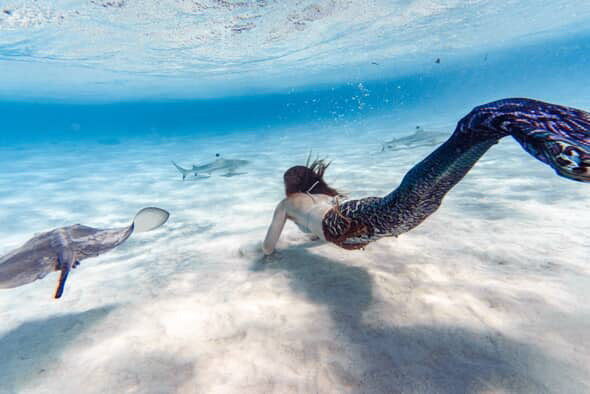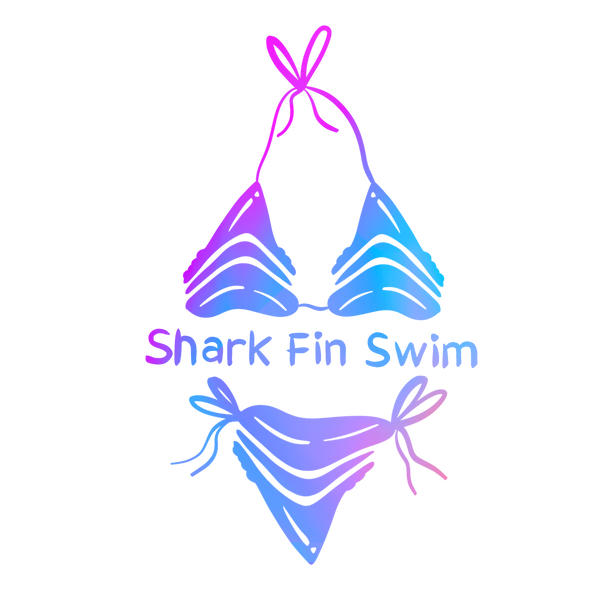
Get to Know a Mermaid with Katie; mermaid certification and safety
Share
Get to Know a Mermaid!
Welcome to a new blog series with Shark Fin Swim. I’m Hope, the founder and ocean illustrator behind Shark Fin Swim. Our small business helps raise awareness for ocean conservation through our hand drawn colorful prints perfect for ocean lovers. Using eco friendly materials and production practices we are bringing ocean advocates a more sustainable option for swimwear. As a biologist and purpose driven small business owner this blog series is going to give you an inside look of what it’s like to be a Marine Scientists Biologists, Diver, Professional mermaid and so much more! Let’s meet our mermaid and diver for this week!
Can you give us a brief instroduction into what you do at Moffitt’s Mermaids?
Moffitt’s Mermaids is my freelance company, where I teach scuba diving certifications and mermaid certifications in a safe and positive environment. I decided to become a freelance instructor back in 2021 when I felt like I could teach more environmentally aware and safer classes than what I had seen at dive shops on island. Also, being able to teach on my own has allowed me to teach in custom small group sizes that really enhances the learning environment and is so my jam to teach 1x1!

Photo via @Moffitt.Katie
How old were you when you got first got PADI certified?
I got initially PADI Open Water certified back in 2013 when I was 18 years old with my family back in Texas. I was going to school for Marine Biology so my mom figured I would need to know how to scuba dive one day, so we figured why not get it together.

Photo by Fin Prakittiphoom on Unsplash
What started your passion and interest in diving?
So kinda a fun story, I really didn’t get truly into scuba diving until I had moved to Big Island of Hawaii. I was even initially in a scientific diving course in college my senior year and then dropped out because it was too much stress with my course load. Now look at me now and this being my life, hahaha.
How do scuba diving safety and mermaid training safety overlap?
Scuba and Mermaid training actually overlap in a lot of ways. When it comes to safety, both certifications have you go over the safety aspect in the ELearning and in person when you first get started with your certification. That’s why in scuba and mermaid classes it’s the first few skills you learn are the biggest and most common safety things that happen in scuba and in mermaiding.

Photo via @Moffitt.Katie
What’s the most common thing students struggle with when going through certification trainings?
I would say the most common things most students struggle with that I see is trusting your instructor (of all the things, haha). I get a lot of people that will be overthinking the whole certification and I have to get them to calm down and just focus on what I’m telling them and let me focus on everything else. You have to think when was the last time as an adult you learned a brand new skill, so it can be a lot for people to completely trust this other person to keep them safe. But that’s another reason I love my small group sizes, so I can personalize it to the individual and make them feel so comfortable in the water, and feel confident coming out of the course!
Do you have any safety tips for snorkelers or swimmers who don’t scuba on how to be safer in the water that people might not think of?
I would say for snorkelers to be safer in the water would be to know your limits and go with someone more experienced. If you are not comfortable in the water, having someone that knows the area, water, and if something happens and can help you is a hugeee help. Also, just getting in the water more will give you more confidence. It’s just like anything else, the more you do it the more confidence you’ll have in that area!
There are many different levels of PADI dive certifications, what’s your favorite one to teach and why?
I love to teaching all PADI courses, but if I had to choose a favorite to teach it would be the Rescue scuba course. It’s so fun to teach because it’s basically a big acting course in the water and I love to make it a lot of fun while still talking about serious topics. I tell people it’s the most important course you will take with PADI because it could save a life. So it can be a little serious, but I still like to have fun in the class playing ‘victim’ and ‘hero’ and giving my divers so much confidence coming out of the course!
Can you explain a little about what mermaid certification courses look like and why they’re important for safety?
Mermaiding is a pretty new area for most people in terms of extracurricular activities. So when it comes to safety, it’s pretty similar to freediving except with a fabric tail and monofin on, haha! The safety with mermaiding we practice taking the tail on and off on land, in shallow water, and deep water. We practice the mermaiding movement on the surface before going underwater all with a mask on. We also practice proper breath-up techniques like freediving before diving down underwater. Then in the Advanced courses we go over how to rescue a mermaid from having a shallow water blackout in open water, same to a freediving course as well. Safety is my top concern in all classes I teach and I make sure to emphasize that in any course I teach too.

Photo via @Moffitt.Katie
What’s your stance on the infamous competition between the free diving and scuba diving communities?
I think I’m a bit of unicorn when I say I love scuba, freediving, and mermaiding because most people only like one area and stay with it. I think each area has its own joys and can be fun in its own way. I like to tell people scuba is like casual strolling and relaxing. Freediving is like running and meditating. And Mermaiding is just so magical and so fun underwater. Each have their own joy of being in the water and I think that’s what should be celebrated. So anyone that is in competition with one sport against the other can go talk to someone else, because clearly you’re not seeing the bigger picture of letting people do what they want to do in the water that makes them happy. And biggest takeaway being, just because it’s not for you doesn’t mean it can’t be for someone else! The ocean is for everyone, it has no biased, no judgement, no predisposition, it accepts all and we should just do what makes us happy and give back to the ocean as much as we can in ocean conservation.
What advice would you give someone who isn’t sure if scuba diving is right for them?
Anyone nervous about scuba should try it out with the right instructor. I think finding an instructor that makes you feel confident, encouraging, and is positive makes a hugeeee difference in your training. So if interested go talk to your local dive shop and talk to the actual instructor in for your course to get a feel of their energy. I think anyone can at least try it out with the right instructor. That being said, it’s also OKAY if you try it out and think it’s not for you. As an instructor, I want everyone to love it, but I do understand that not everyone will necessarily love it as much as I do and that’s okay. Love for scuba and the ocean isn’t a competition, and if people only want to do it occasionally and on vacation that’s completely normal and think that’s totally fine. But you might be surprised and find out how easy it is to be underwater and be in your own little world!
